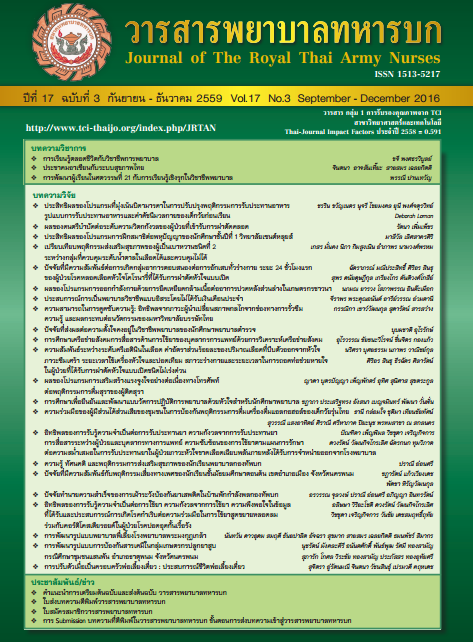ปัจจัยทำนายความสำเร็จของการเฝ้าระวังป้องกันยาเสพติด ในบ้านพักกำลังพลกองทัพบก
Keywords:
ความสำเร็จของการเฝ้าระวังป้องกันยาเสพติด, บ้านพักกำลังพลกองทัพบก, success in monitoring and preventing addictive substance use, army communityAbstract
การวิจัยเชิงพรรณนานี้ มีวัตถุประสงค์เพื่อศึกษาปัจจัยทำนายความสำเร็จของการเฝ้าระวังป้องกันยาเสพติดในบ้านพักกำลังพลกองทัพบก กลุ่มตัวอย่าง จำนวน 150 คน เลือกกลุ่มตัวอย่างด้วยวิธีการสุ่มอย่างง่ายเครื่องมือที่ใช้คือแบบสอบถาม ปัจจัยที่เกี่ยวข้องกับปัญหายาเสพติดและความสำเร็จในการเฝ้าระวังป้องกันยาเสพติด ตามกรอบแนวคิดแบบจำลอง PRECEDE – PROCEED การตรวจสอบคุณภาพเครื่องมือ โดยการหาความตรงของเนื้อหา และหาค่าความเชื่อมั่นโดยวิธีของครอนบราคได้ค่าสัมประสิทธิ์แอลฟาเท่ากับ0.86 และ 0.89การวิเคราะห์ข้อมูลโดยสถิติเชิงบรรยายและการวิเคราะห์ถดถอยพหุ ผลการวิจัยพบว่า ปัจจัยภายใน ปัจจัยภายนอก และปัจจัยสนับสนุนที่เกี่ยวข้องกับปัญหายาเสพติด คะแนนเฉลี่ยสูงสุด คือ ครอบครัวที่อบอุ่นจะเป็นเกราะป้องกันปัญหายาเสพติด ( = 4.82, S.D. = 0.45) ชุมชนบ้านพักมีการลงโทษอย่างเฉียบขาดต่อผู้ที่เสพสารเสพติด ( = 3.77, S.D. = 1.05) และในชุมชนมีแหล่งพักผ่อนหย่อนใจ / ลานกีฬา ( = 3.99, S.D. = 0.79) ตามลำดับ ส่วนความสำเร็จในการเฝ้าระวังป้องกันยาเสพติดในชุมชนบ้านพักที่มีคะแนนเฉลี่ยสูงสุด ได้แก่ ทุกคนในชุมชนบ้านพักมีส่วนร่วมในการสอดส่องดูแลเฝ้าระวังป้องกันปัญหายาเสพติดในชุมชน ( = 4.17, S.D. = 0.78) การวิเคราะห์ตัวแปรทำนายความสำเร็จในการเฝ้าระวังป้องกันยาเสพติดในชุมชนบ้านพัก พบว่าตัวแปรปัจจัยภายนอก (r = .692, p<.01) และ ปัจจัยภายใน (r = .238, p<.01) สามารถทำนายความสำเร็จในการเฝ้าระวังป้องกันยาเสพติดในชุมชนบ้านพัก โดยมีประสิทธิภาพการทำนาย ร้อยละ 50.7 ( Adjusted R2 = .507, F = 10.772, p<.01 ผลการวิจัยสามารถนำไปใช้ประโยชน์ในการการสร้างรูปแบบการเฝ้าระวังป้องกันยาเสพติดแบบมีส่วนร่วมในบ้านพักกำลังพลกองทัพบกโดยที่ผู้ที่อาศัยในชุมชนมีส่วนร่วม
Predictive factors of the success of monitoring and preventing addictive substance use in the army community
This descriptive research was aimed to study the predictive factors of the success in monitoring and preventing addictive substance use in the army community. The samples composed of 150 residents of an army personnel housing community in Bangkok by using simple random sampling method. The research instruments were the questionnaires which included associated factors of addictive substance use problems based on PRECEDE-PROCEED model, and the success of monitoring and preventing addictive substance use, which were tested for content validity and reliability, the Cronbach’s alpha were 0.86, and 0.89. Data analysis were conducted by using descriptive statistics, and multiple regression. The results revealed that the highest mean scores of the internal factors, external factors, and supporting factors related to addictive substance use were; good relationship among family members ( = 4.82, S.D. = 0.45), the strict punishment regulations for substance use of the community ( = 3.77, S.D. = 1.05), and the availability of recreational place such as sport play ground in the community ( = 3.99, S.D.=0.79) respectively, while the highest mean score of the success in monitoring and preventing addictive substance use was the community participating in monitoring and preventing addictive substance use ( = 4.17, S.D. = 0.78). The external factors (r = .692, p<.01) and the internal factors (r = .238, p<.01) can predict the success in monitoring and preventing addictive substance use in the army community with prediction’s efficiency of 50.7 percents (Adjusted R2 = .507, F = 10.772, p<.01). The results can be useful to develop the participation of people in monitoring and preventing addictive substance use model for the army community.
Downloads
Downloads
How to Cite
Issue
Section
License
บทความหรือข้อคิดเห็นใดใดที่ปรากฏในวารสารพยาบาลทหารบกเป็นวรรณกรรมของผู้เขียน ซึ่งบรรณาธิการหรือสมาคมพยาบาลทหารบก ไม่จำเป็นต้องเห็นด้วย
บทความที่ได้รับการตีพิมพ์เป็นลิขสิทธิ์ของวารสารพยาบาลทหารบก
The ideas and opinions expressed in the Journal of The Royal Thai Army Nurses are those of the authors and not necessarily those
of the editor or Royal Thai Army Nurses Association.






